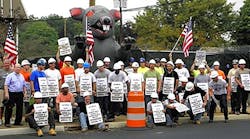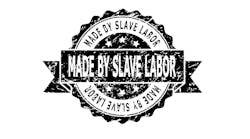The Trump-era National Labor Relations Board is continuing to reverse policies that in the past granted the unions broad privileges when it comes to their organizing activities.
One of these could eventually result in the giant inflatable Scabby the Rat facing termination with extreme prejudice sometime in the near future. Another decision recently handed down by the board allows employers to ban nonemployee union organizers from their premises.
On May 14, NLRB general counsel Peter B. Robb recommended that the board reverse several Obama-era policies as not being lawful, including ones that permitted the use of such balloons, as well as the erection of stationary banners, to picket company facilities of firms that are not the primary target of the union action but are doing business with the firm that is.
Variations of the giant inflatable rodent called Scabby the Rat and his other inflatable brothers and sisters have been showing up on union picket lines for more than 30 years. They and others like them in a variety of sizes and designs are rented by the unions from a company that has specialized in this service for decades.
Earlier this year a U.S. Appeals Court upheld the right of a midwestern town to enforce an ordinance banning displays like the rampant rodent, which meant that other localities with similar ordinances should be able to enforce them as well. (3-15-19, P. 2).
During the Obama years, the pro-union NLRB majority took the position that the inflatable rats did not have an unlawful or coercive effect. The Obama-era board engaged in a bit of sleight of hand by equating these large rats—which are clearly intended to block access—as nothing more than informational banners. At that time, the board ruled the use of Scabby was just like other peaceful activities, such as hand-billing and holding signs on the picket line, and was protected by federal labor law and the First Amendment.
This allowed unions to station Scabby the Rat and his counterparts at third-party companies’ locations to pressure the third party to stop dealing with the company with which the union actually had a dispute, explain attorneys Christopher Bacon and Adam Endick of the law firm of Vinson & Elkins LLP.
“For example, they might place the rat in front of a hotel or apartment building that was using a non-union exterminator,” they note. “If that placement of a large inflatable had been deemed picketing, it would have been secondary picketing, which is a violation of labor laws. On the other hand, if it was only informational bannering, it would be allowed under the labor laws.”
In an advice memo issued recently by Robb at the request of an NLRB regional office that was handling one of these cases, he suggested that the use of inflatable rats may be considered illegal secondary picketing when used at a neutral employer’s job site. Secondary boycotts and other actions like picketing that target businesses the union is not directly targeting for organizing or negotiation over contract terms have long been held to be illegal by the Supreme Court.
Whether the General Counsel’s position will become law or his case is simply over-inflated ultimately will be settled by the courts. Earlier this year the Seventh Circuit U.S. Court of Appeals issued an opinion affirming the right of the town of Grand Chute, Wis., to enforce an ordinance prohibiting such displays. The court rejected the union’s argument that the town had violated its First Amendment rights.
In another case, on June 19 a Brooklyn, N.Y., federal judge denied the NLRB’s request for a preliminary injunction to stop a union from using Scabby and an inflatable cockroach at several Staten Island supermarkets to pressure them not to do business with a builder with which the union was having a dispute. A hearing on the merits of the case will be scheduled at a later date.
Organizers Can’t Go In
On June 14, the board handed down a decision making it more difficult for unions to solicit employees, strategize with supporters or engage in other activities on an employer’s property by permitting employers to prohibit anyone who is not an employee from being on their premises.
Although a string of Supreme Court decisions has upheld a union’s right to enter an employer’s premises, there are exceptions. The board interpreted these to allow it to come to the conclusion that the relevant question to be answered is whether a union can access employees without entering the employer’s property.
The NLRB reasons that if a union can access employees in some other way, the union does not have an automatic right to access the employer’s property, even if the property is open to the public. Instead, at this point, the employer must simply treat the union the same way that it would other third parties seeking to solicit employees in company facilities.
“Thus, even if an employer makes its property open to the general public, the NLRB recognized that the employer may restrict and manage activities on its property even in a way that might prohibit union solicitation,” says attorney William Kishman of the law firm of Squire Patton Boggs.
The case examined by the NLRB involved two union representatives who had been ejected by a security guard from a public cafeteria at a hospital, which had been restricted to hospital employees, patients and their families. In the past, the employer had ejected other outside parties from soliciting in the cafeteria.
Kishman stresses that this case does not provide employers with unfettered discretion. If an employer wishes to implement a “no third-party solicitation” policy, it needs to make sure that it adheres to several important requirements.
An employer still may not single out union activity—any ban on third-party solicitors must be non-discriminatory. It remains unlawful for an employer to prohibit these types of union activities but permit them by other third parties (although in some cases it may be permissible to authorize certain types of limited third-party solicitation).
Even if the employer applies this policy equally against all third-party solicitors, it would be unlawful for it to implement that policy in response to union organizing activities. As a result, if an employer wishes to prohibit third-party solicitation on its property, it is vital that the company update its policies proactively instead of waiting until a union organizing campaign occurs.
Federal labor law still prohibits employers from going out of their way to “spy” on union activities (absent limited exceptions). If an employer implements this type of third-party solicitation ban, it needs to make sure that it also refrains from singling out union activities when monitoring for violations and otherwise avoids creating the impression of unlawful surveillance of protected concerted activities.
This new decision specifically targets non-employee solicitation, Kishman points out. A different test governs whether an employer may prohibit employees themselves from soliciting for a union on an employer’s property. Employees themselves still have a right to solicit in many situations including, among others, when the employees are on breaks.




